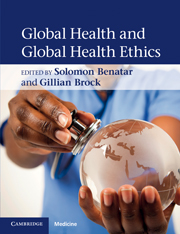Book contents
- Frontmatter
- Contents
- List of contributors
- Introduction
- Section 1 Global health, definitions and descriptions
- Section 2 Global health ethics, responsibilities and justice: some central issues
- Section 3 Analyzing some reasons for poor health
- Section 4 Shaping the future
- 20 The Health Impact Fund: how to make new medicines accessible to all
- 21 Biotechnology and global health
- 22 Food security and global health
- 23 International taxation
- 24 Global health research: changing the agenda
- 25 Justice and research in developing countries
- 26 Values in global health governance
- 27 Poverty, distance and two dimensions of ethics
- 28 Teaching global health ethics
- 29 Towards a new common sense: the need for new paradigms of global health
- Index
- References
27 - Poverty, distance and two dimensions of ethics
Published online by Cambridge University Press: 01 March 2011
- Frontmatter
- Contents
- List of contributors
- Introduction
- Section 1 Global health, definitions and descriptions
- Section 2 Global health ethics, responsibilities and justice: some central issues
- Section 3 Analyzing some reasons for poor health
- Section 4 Shaping the future
- 20 The Health Impact Fund: how to make new medicines accessible to all
- 21 Biotechnology and global health
- 22 Food security and global health
- 23 International taxation
- 24 Global health research: changing the agenda
- 25 Justice and research in developing countries
- 26 Values in global health governance
- 27 Poverty, distance and two dimensions of ethics
- 28 Teaching global health ethics
- 29 Towards a new common sense: the need for new paradigms of global health
- Index
- References
Summary
In the rich countries, we are all vaguely aware that there is an appalling degree of poverty in the developing world. But, perhaps through wanting to avoid psychological discomfort, we usually manage to minimize the scale of its human devastation. In sub-Saharan Africa, the median age at death is less than 5 years. Amartya Sen, who quotes this figure from the 1993 World Development Report of the World Bank, understandably feels it necessary to point out that this astounding figure is not a typographical error (Sen, 2005). He goes on to say the figure has got worse since the AIDS epidemic hit hard.
We know that the poverty, the shortages of water and the lack of available medical care are not just natural phenomena. They come about through the interaction of the natural and the social. They are, at least partly, remediable by human action. So what moral claims do babies born in Africa with such a horrifyingly but avoidably low life expectancy have on us?
Oxfam at one time used a poster with a picture of a starving African child and a slogan that said something like “If he was here in front of you, you would buy him a meal. Is it really different because he is far away?”
The answer to that question has all sorts of qualifications about the effectiveness of acting at a distance, but on the central issue the suggestion on the poster is right.
- Type
- Chapter
- Information
- Global Health and Global Health Ethics , pp. 311 - 318Publisher: Cambridge University PressPrint publication year: 2011
References
- 1
- Cited by

